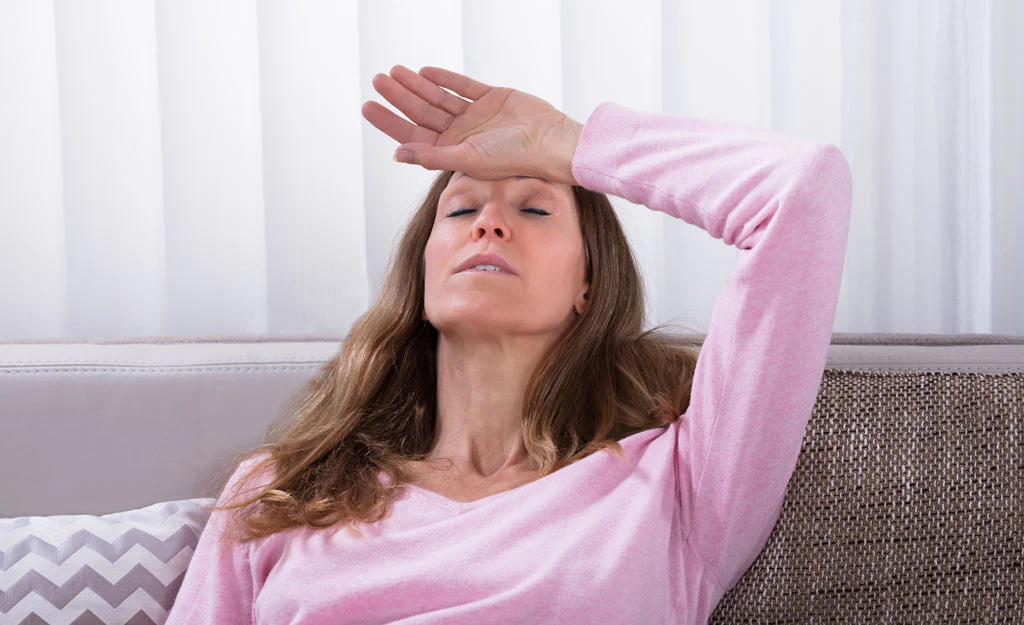Ever felt totally drained, frequently hungry, or overwhelmed with racing thoughts at night? You’re not alone. Many women experience these symptoms, and more, which could be signs of a specific type of fatigue associated with menopause. It’s a sudden, overwhelming lack of energy that can be so debilitating it interferes with your daily activities.
This fatigue, both mental and physical, is a common symptom of menopause, tied to decreasing estrogen levels and other hormonal changes. It’s not just about feeling tired; it’s an exhaustion that persists even after rest. Let’s find out the causes, symptoms, and ways to boost your energy levels during menopause.

Contents
- 1 Does Menopause Cause Exhaustion?
- 2 Causes of Exhaustion During Menopause
- 3 How To Improve Fatigue In Menopause?
- 4 Frequently Asked Questions
- 4.1 Why does menopause cause exhaustion?
- 4.2 How is menopausal fatigue different from other conditions like Anemia or Chronic Fatigue Syndrome?
- 4.3 Are night sweats and hot flashes related to menopausal fatigue?
- 4.4 Can lifestyle changes reduce menopause-related exhaustion?
- 4.5 Can nutritional deficiencies add to menopausal fatigue?
Does Menopause Cause Exhaustion?
Absolutely, menopause can lead to exhaustion. Many women report feeling unusually tired during menopause. This fatigue can be attributed to several factors related to menopausal changes:
-
Hormonal Fluctuations: The decline in estrogen and progesterone levels during menopause can directly impact energy levels, leading to feelings of tiredness and exhaustion.
-
Poor Sleep: Menopausal symptoms such as night sweats and hot flashes can disrupt sleep, leading to insomnia or restless nights. Poor sleep quality and quantity can significantly contribute to daytime fatigue.
-
Emotional Stress: Menopause can be a stressful time due to hormonal changes and other life transitions. Anxiety and depression, which are more common during menopause, can also lead to feelings of fatigue.
-
Physical Changes: Other physical changes and symptoms associated with menopause, such as muscle and joint pain, can further exacerbate feelings of tiredness.
Causes of Exhaustion During Menopause
Exhaustion during menopause is a common complaint among women undergoing this transitional phase. Several factors contribute to increased feelings of fatigue, including hormonal, physiological, and emotional changes:

1. Hormonal Changes
The fluctuating levels of estrogen and progesterone during menopause directly affect energy levels. Estrogen is involved in regulating the metabolism and energy use within the body. As estrogen levels decline, women might experience lower energy levels and increased fatigue.
2. Sleep Disturbances
Menopausal symptoms such as night sweats and hot flashes can significantly disrupt sleep patterns. These disturbances can lead to insomnia or fragmented sleep, reducing sleep quality and quantity, which results in daytime tiredness and exhaustion.
3. Emotional and Psychological Factors
Menopause can be a period of significant emotional adjustment. The hormonal changes can also influence mood and mental well-being, potentially leading to anxiety and depression, both of which are energy-draining. Stress management and emotional support are crucial during this time.
4. Physical Health Changes
Weight gain and changes in metabolism are common during menopause. These factors can contribute to decreased physical activity, leading to further reductions in energy. Additionally, joint pain and muscle aches, often reported during menopause, can make it harder to stay active, contributing to overall fatigue.
5. Lifestyle Factors
Lifestyle habits such as diet and exercise play a significant role in energy levels. An imbalance in diet, such as low iron intake, can lead to anemia, which is associated with fatigue. Regular physical activity can help improve energy levels, but the motivation to exercise can be lower if one is already feeling exhausted.
How To Improve Fatigue In Menopause?
Here are some effective strategies:

1. Optimize Sleep
- Establish a Routine: Go to bed and wake up at the same time every day to regulate your body’s internal clock.
- Create a Sleep-Inducing Environment: Keep your bedroom cool, quiet, and dark. Invest in comfortable bedding and consider using blackout curtains or a sleep mask.
- Limit Stimulants: Avoid caffeine and nicotine close to bedtime, as they can disrupt sleep.
- Manage Night Sweats: Use light, breathable nightwear and bedding. A fan or a cool room can also help manage hot flashes during the night.
2. Adjust Diet and Nutrition
- Balanced Meals: Eat a balanced diet rich in fruits, vegetables, lean proteins, and whole grains to maintain energy levels.
- Stay Hydrated: Dehydration can contribute to fatigue. Drink plenty of water throughout the day.
- Limit Sugar and Processed Foods: These can cause energy spikes and crashes, affecting overall energy levels.
- Consider Supplements: Speak with a healthcare provider about supplements like vitamin D, B vitamins, and magnesium, which can sometimes help with fatigue.
3. Increase Physical Activity
- Regular Exercise: Engaging in regular physical activity can boost energy levels and help improve sleep. Activities like yoga, swimming, and walking are excellent options.
- Strength Training: This can help combat muscle loss associated with aging and improve metabolic rate.
4. Manage Stress
- Mindfulness and Meditation: Techniques such as yoga, meditation, and deep-breathing exercises can reduce stress and improve overall well-being.
- Cognitive Behavioral Therapy (CBT): This can be particularly helpful if psychological factors like anxiety or depression are contributing to fatigue.
5. Medical Treatments
- Hormone Replacement Therapy (HRT): For some women, HRT can alleviate many menopausal symptoms, including fatigue, by stabilizing hormone levels. Discuss the risks and benefits with your healthcare provider.
- Alternative Therapies: Acupuncture or herbal remedies like black cohosh may help some symptoms of menopause, though it’s important to discuss these with a doctor before starting.
6. Social and Emotional Support
- Connect with Others: Joining menopause support groups or talking with friends going through similar experiences can provide emotional support and practical advice.
Frequently Asked Questions
Why does menopause cause exhaustion?
Menopause often leads to exhaustion due to hormonal imbalances, particularly a decrease in estrogen levels. This reduction can result in various symptoms such as fatigue, irritability, and brain fog. Numerous factors, including night sweats, hot flashes, disrupted sleep, and low thyroid hormone or iron levels, can exacerbate exhaustion during this phase.
How is menopausal fatigue different from other conditions like Anemia or Chronic Fatigue Syndrome?
While menopausal fatigue is primarily driven by hormonal changes, conditions like Anemia or Chronic Fatigue Syndrome are often associated with underlying health issues. Thus, it’s vital to seek medical guidance to precisely diagnose the source of fatigue; untreated health problems may worsen exhaustion.
Yes, night sweats and hot flashes, common symptoms of menopause, often disrupt sleep patterns, thus worsening fatigue. Managing these symptoms can significantly improve menopausal fatigue.
Absolutely. Engaging in regular physical activity, reducing nicotine and alcohol intake, ensuring adequate sleep, and prioritizing regular medical check-ups can reduce menopausal tiredness. It’s also crucial to focus on mental health care, as maintaining a sound mental state can help manage physical exhaustion.
Can nutritional deficiencies add to menopausal fatigue?
Yes, low iron levels and low thyroid hormones, often tied to nutritional deficiencies, can contribute to energy depletion during menopause. Adequate nutrition, therefore, plays an integral part in managing menopausal fatigue.
I am a medical student with experience and interest in Women’s health and well-being.